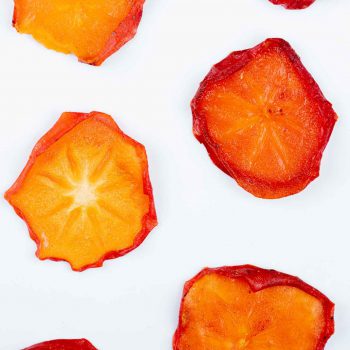
Export Dried Persimmon
CATALOGUE
Persimmon trees have been grown for thousands of years for their delicious fruit and beautiful wood. Their orange-colored fruits called persimmons are known for their sweet, honey-like flavor.
While hundreds of types exist, the Hachiya and Fuyu varieties are among the most popular. The heart-shaped Hachiya persimmons are astringent, meaning they are very high in plant chemicals called tannins that give the unripe fruit a dry, bitter taste. This type of persimmon needs to be fully ripe before eating. Fuyu persimmons also contain tannins, but they are considered non-astringent. Unlike Hachiya persimmons, the crisp, tomato-shaped Fuyu variety can be enjoyed even when not completely ripe.
Iranian Persimmon
Iranian persimmon fruits are nearly round, shiny, and hard-skinned. they are about 2.5 CM in diameter and the color when ripe ranges from a faded orange to a slight red color. They ripen from Oct to Nov, usually after the tree has lost its leaves.
Which city or Province grows: Tehran.
Harvest Season: Fall.
Persimmon tree
Persimmon Tree: The Iranian persimmon tree grows 3.5 to 6 meters tall and 2 to 3.5 meters wide. The oriental persimmon tree is not hardy in zone five and is a smaller stature tree.
Persimmon leaves
Persimmon Leaves: The leaves of the Iranian persimmon tree are an alternate, simple, and rich green color. The leaf margins can be entire or quite serrated.
persimmon Nutrition information
-
Calories: 118
-
Protein: 1 grams
-
Fiber: 6 grams
-
Carbohydrates: 31 grams
-
Fat: 0.3 grams


Health Benefits of persimmon
Persimmons can be eaten fresh, dried, or cooked and are commonly used around the world in jellies, drinks, pies, curries, and puddings. Not only are persimmons tasty, but they’re also packed with nutrients that can benefit your health in several ways.
Here are 6 benefits of dried persimmon:
1) Loaded with Nutrients
Persimmons are high in important vitamins and minerals, including vitamins A, C and B, potassium and manganese. They also contain beneficial plant compounds like tannins and flavonoids.
2) Excellent Source of Powerful Antioxidants
Persimmons contain beneficial plant compounds that have antioxidant qualities.
Antioxidants help prevent or slow cell damage by counteracting oxidative stress, a process triggered by unstable molecules called free radicals.
Persimmons are an excellent source of powerful antioxidants like carotenoids and flavonoids. Diets rich in these compounds have been linked to a reduced risk of certain diseases, including heart disease and diabetes.
3) May Benefit Heart Health
Heart disease is the leading cause of death worldwide and negatively impacts the lives of millions of people. Fortunately, most types of heart disease can be prevented by reducing risk factors, such as an unhealthy diet.
Persimmons contain flavonoid antioxidants and tannins, which benefit heart health by reducing blood pressure, lowering inflammation, and decreasing cholesterol levels.
4) May Help Reduce Inflammation
Conditions like heart disease, arthritis, diabetes, cancer, and obesity are all linked to chronic inflammation. Persimmons also contain carotenoids, flavonoids, and vitamin E, all of which are potent antioxidants that fight inflammation in the body. Persimmons are rich in the powerful antioxidant vitamin C, which helps lower inflammation, a common cause of many diseases.
5) Rich in Fiber
Having too much cholesterol, especially “bad” LDL cholesterol, can increase the risk of heart disease, stroke, and heart attack.
Fiber-rich foods like persimmons can help lower cholesterol, reduce blood sugar levels and keep your digestive system healthy.
6) Support Healthy Vision
Persimmons provide lots of vitamin A and antioxidants that are critical for health. In fact, one persimmon delivers 55% of the recommended intake of vitamin A.
Persimmons are high in vitamin A, lutein, and zeaxanthin — all nutrients that support healthy vision.
Persimmons are Delicious and Easy to Add to Your Diet
Persimmons can be added to a variety of dishes to provide an extra boost of nutrition.
These fruits can be enjoyed fresh as a simple snack or used in delicious recipes. In fact, they pair excellently with both sweet and savory foods.
Here are some ways to add persimmons to your diet:
- Slice persimmons onto a salad for a flavorful addition.
- Top your morning yogurt or oatmeal with fresh or cooked persimmon for a burst of natural sweetness.
- Roast persimmons in the oven and drizzle with honey for a tasty and healthy dessert.
- Mix dried or fresh persimmon into muffin, bread or cake mix.
- Combine with berries and citrus fruits for a delicious fruit salad.
- Broil persimmon and serve with baked Brie for a tasty appetizer.
- Bake persimmons with chicken or meat for a unique flavor combination.
- Throw frozen persimmons into your favorite smoothie recipe for extra nutrients.
- Slice and dry persimmons in the oven to make natural fruit strips.
- Persimmons are sweet, versatile fruits full of vitamins, minerals, fiber and beneficial plant compounds.
What’s more, they may promote heart health, reduce inflammation, support healthy vision and keep your digestive system healthy. Plus, they are tasty and pair well with many foods.
With all the benefits that persimmons have to offer, adding these tasty fruits to your diet should be a no-brainer.
Sepcotrading company exports the best kind of Iranian dried fruits like dry persimmons at the most affordable prices all around the world. Click following button now.
Contact Now
FAQ
Dried persimmons are excellent on their own, perhaps accompanied with a steaming cup of green tea. they’re also an interesting addition to the cheeseboard and work thoroughly chopped up in scones and almond biscotti.
Thanks to its valuable components with high antioxidant characteristics, persimmon has many beneficial effects mainly on digestive and cardiovascular systems. Persimmon is rich in carbohydrates, carotenoids, phenolic compounds, including condensed tannins, vitamins A and C, minerals, and nutritional fiber.
Keep dried persimmons in a refrigerator so you can enjoy them for up to 1 month. Wrap each one in plastic wrap, and put them in a sealable bag. if you want to keep more longer, freeze them. it will be last for 3 months.
Eating a variety of colorful fruits and vegetables every day may decrease the risk of disease. The yellow-orange persimmon fruit is an high-quality source of fiber, vitamin A and C, vitamin B6, potassium and the mineral manganese. Persimmons are fats-loose and are an excellent source of healthy carbohydrates and natural sugar.





